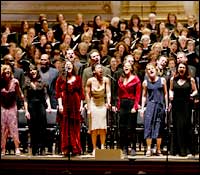
Photo: Chris Lee
Most of Leonard Bernstein’s major works are a bit untidy, to say the least—Candide, anyone?—but his Mass is perhaps the messiest of all. Commissioned to celebrate the opening of the Kennedy Center in Washington, and first performed there on September 8, 1971, Mass was mostly viewed by an appalled music press as an embarrassment. This time, they said, Lenny had gone too far with a mixed-up-media theater piece that took religion, pop culture, radical chic, symphonic pretension, and sheer gall to new extremes of bad taste. The production came to New York soon after the Washington premiere, everyone got hot under the collar once again, and then Mass more or less went underground. The recent concert performance by the Collegiate Chorale in Carnegie Hall was the first hereabouts in nearly 30 years. I well remember driving to Washington that muggy Labor Day weekend in 1971, prepared by the advance buzz, like most everyone else, to hate the piece. Much to my astonishment, I loved it, and said so in the London Times, which had asked me to cover the event. After that, it didn’t come as a shock that Bernstein, for the rest of his busy life, generously gave me his time whenever I needed to interview him. Later on, I found out that he was eternally grateful for that one friendly review amid so much hostility. Yes, I suppose Mass does frequently go over the top as the anonymous Celebrant suffers a spiritual crisis, smashes the symbols of his faith, eventually heals, and passes on the “touch of peace” to the audience. It was mostly the troped-in English lyrics, by Stephen Schwartz and the composer himself, that made people squirm, and the groovy language is often pretty hard to take (the worst bits were edited out or smoothed over in the edition the Collegiate Chorale performed). But the music still strikes me as inspired in all its messy, gloriously bighearted embrace of so many musical idioms, popular and classical, all of them styles in which Bernstein worked with creative enthusiasm and, yes, extraordinary technical craft. The rhythmic energy, melodic invention, theatrical pacing, and, for better or worse, utter conviction behind every expressive gesture more than carry the piece, and some of the compositional somersaults are dazzling—Bernstein was always wary of serial music, but he could manipulate a tone row with the best of them. The Collegiate Chorale performance conducted by Robert Bass was a fairly straightforward, skillfully managed concert presentation, but this is hardly the ideal way to experience a work so dependent on stage movement and visual confrontation. Then, too, Douglas Webster lacks the vocal allure and charisma to make the Celebrant the dominant musical-dramatic presence he must be. I suspect that Douglas, and indeed the entire hardworking cast, would be more effective in a staged version, and Bernstein might well have thought so, too. After hearing a rough-edited copy of the CBS recording of Mass, he told me in a letter, “The work was conceived so totally in theatre terms that I almost cannot recognize it divorced from its theatrical setting.” I think that says it all, and I hope a major opera company will one day find the resources—and the nerve—to give Mass the sort of committed full-scale theatrical treatment it needs and deserves.
Compared with other obscurities recently disinterred by Teatro Grattacielo from that scorned era of Italian opera known as verismo (circa 1880 to 1930), the group’s latest offering in Alice Tully Hall, Alfredo Catalani’s La Wally, seemed positively déjà vu. I can recall at least two previous concert performances, there are several complete recordings, and the soprano’s big Act One aria is featured on TV commercials. Still, it’s always salutary to hear this lovely score, especially when it’s sung and played with such enthusiasm and real affection for its special qualities. Actually, Catalani was a classicist at heart, closer in spirit to Verdi and Ponchielli than to the up-and-coming generation of Italian veristas. He was a fastidious craftsman, and there is a fragile delicacy about La Wally’s music, especially in its atmospheric evocation of the misty, snow-covered slopes of the Austrian Tyrol where the action takes place. Conductor Guido Ajmone-Marsan fully appreciated that important ingredient in the score, but he also paid equal attention to the warm human element, the tragic love of Wally and Hagenbach that Catalani traces with such lyrical eloquence. And this time, Teatro Grattacielo found a cast worthy of the occasion. Manon Feubel’s vibrant soprano and expressive generosity made her a most appealing Wally, Frank Porretta sang Hagenbach with welcome security, and Brian Davis’s strong baritone turned Gellner into a particularly dangerous rival.
The first half of Amy Burton’s tribute to Yvonne Printemps—“A French Diva Unveiled,” at Florence Gould Hall—was enough to convince me that this treasurable soprano had made a mistake. The flat narration written by Jean-Philippe Clarac and Olivier Deloeuil, charmlessly read by Jacqueline Chambord, was bad enough; but Burton herself, singing some of the chanteuse’s best material and coyly frolicking on a frilly double bed, never got into Printemps’s skin, let alone found her voice. Printemps was one of France’s great vocal originals, who flourished in the music hall, operetta, film, and, apparently, the bedroom during the first half of the last century. Her singular voice, seductive presence, piquant style, and sheer joy of performing can still be relished on CD reissues and in several movies—watch Les Trois Valses of 1938 and try to resist her. This impersonation was simply too respectfully studied to take wing or assume a life of its own, and one soon longed for the real thing. Now that the talented Burton has gotten this misguided homage out of her system, she can go back to what she does best: being herself.
Classical Music Listings
• Highlights
• Classical Music
• Opera
• Dance
• All Listings
Mass
By Leonard Bernstein.
La Wally
By Alfredo Catalani.
A French Diva Unveiled
By Amy Burton.